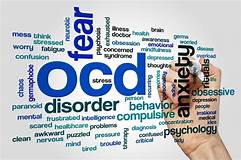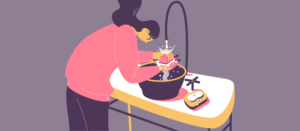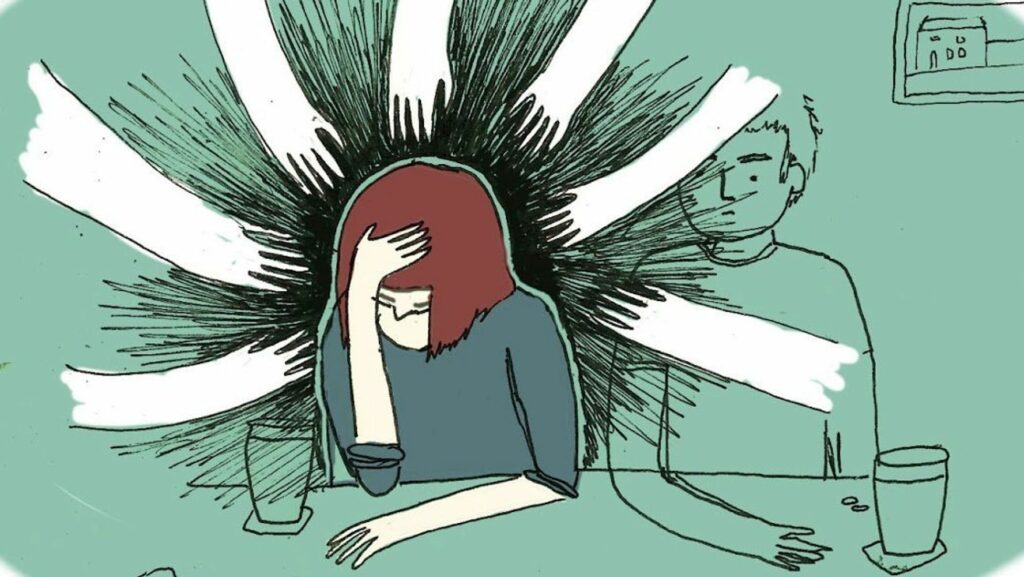Living with OCD is like living in a chaotic world. Everywhere you look some thoughts and images are just too much to handle. It feels like there’s no escape from the chaos, and it’s completely overwhelming. If this sounds like your life, you’re not alone. OCD is Ruining My Life: Living with OCD. OCD is a very common disorder, but that doesn’t make it any easier to deal with. In this blog post, we will discuss what OCD is, how to tackle it, and why it can be so difficult to live with. We will also provide some tips for getting through each day.
OCD, or Obsessive Compulsive Disorder, is a mental disorder that causes people to have intrusive thoughts, images, or urges that are difficult to control. These thoughts and images can be so distressing that they cause anxiety and even panic attacks. For many people with OCD, the only way to relieve the anxiety is to perform certain rituals or compulsions. These compulsions can be anything from hand-washing to counting to checking and rechecking things. The problem is that the relief is only temporary, and the OCD thoughts and images soon return. This can lead to a never-ending cycle of anxiety and compulsions that can be very difficult to break out of.
Contents
What is OCD?
 So far, you have a brief overview of OCD. Discussing OCD in detail can be overwhelming and it generates empathy toward people living with OCD. It is important to understand that everyone experiences OCD differently. Some may have very severe symptoms that interfere with their daily life, while others may only have milder symptoms that are manageable. However, all forms of OCD can be equally distressing.
So far, you have a brief overview of OCD. Discussing OCD in detail can be overwhelming and it generates empathy toward people living with OCD. It is important to understand that everyone experiences OCD differently. Some may have very severe symptoms that interfere with their daily life, while others may only have milder symptoms that are manageable. However, all forms of OCD can be equally distressing.
OCD is constant unwanted repetition without conscious of your conscience. The thoughts, images, or urges get in the way of what you want to think about. The obsessions are usually anxiety-inducing and can be about anything that causes worry.
For example, someone with OCD might be afraid of dirt and germs and obsessively wash their hands several times a day. Or they might be afraid of making mistakes and obsessively checking and rechecking things. Compulsions are the actions that people with OCD take to try to relieve their anxiety. As we mentioned before, the problem is that the relief is only temporary, and the OCD thoughts and images soon return.
OCD makes the person accede to unwanted whims and wants, and the person tends to lose self-confidence. People end up saying OCD is Ruining My Life: Living with OCD.
Living with OCD!
 Living with OCD is an invisible battle with visible triggers. You are not your OCD. Remember, you are so much more than your mental illness. Repeat, I’m enough, I’m worthy, and I’m deserving of love and happiness. Just because you have OCD does not mean that you are destined for a life of misery.
Living with OCD is an invisible battle with visible triggers. You are not your OCD. Remember, you are so much more than your mental illness. Repeat, I’m enough, I’m worthy, and I’m deserving of love and happiness. Just because you have OCD does not mean that you are destined for a life of misery.
There are things that you can do to manage your OCD and live a happy, fulfilling life despite your mental illness. One of the most important things you can do is to educate yourself about your disorder. The more you know about OCD, the better equipped you will be to manage it. Many excellent books and websites can provide you with information and support.
You should also seek out professional help if you are struggling to manage your OCD on your own. A therapist who is experienced in treating OCD can help you to develop coping strategies and work through your fears. If you are considering medication, please speak to a doctor or psychiatrist about the risks and benefits.
OCD can be a very isolating disorder, but it is important to remember that you are not alone. Talk about it, create awareness and let your voice reach people suffering from it or those who have lost all hope.
Chaos and OCD?
 Chaos is something that people with OCD try to avoid. It can be anything from a messy room to a cluttered desk. For many people with OCD, the idea of living in chaos is simply too much to bear. The thought of not being able to find something when they need it or of having to wade through a pile of clothes to find a specific item can be extremely anxiety-provoking.
Chaos is something that people with OCD try to avoid. It can be anything from a messy room to a cluttered desk. For many people with OCD, the idea of living in chaos is simply too much to bear. The thought of not being able to find something when they need it or of having to wade through a pile of clothes to find a specific item can be extremely anxiety-provoking.
OCD can be very chaotic as it makes a personal slave of its demands. However, it is possible to find ways to manage the chaos and live a relatively normal life. One way to do this is to create a system for organizing your belongings. This might involve using labeled storage containers or color-coding your clothing. Having a place for everything can help to reduce the anxiety that comes with living in chaos.
Another way to manage the chaos of OCD is to set limits on how much time you allow yourself to spend on compulsions. For example, you might give yourself five minutes to check the locks on your doors before you leave for work. Once the five minutes are up, you have to leave even if you don’t feel like the locks are secure. This can be a difficult task, but it is important to remember that your OCD thoughts are not reality.
OCD is not an illusion but it creates an illusion in your mind making you believe that you need do something over and over again. It creates a never-ending loop. People end up saying; OCD is Ruining My Life: Living with OCD.
How to tackle OCD?
 The first step in tackling OCD is to understand that you are not your thoughts. Just because you have a thought does not mean that it is true. It is important to remember that your OCD thoughts are not reality.
The first step in tackling OCD is to understand that you are not your thoughts. Just because you have a thought does not mean that it is true. It is important to remember that your OCD thoughts are not reality.
One way to challenge your OCD thoughts is to ask yourself whether the thought is true. For example, if you are afraid of contracting a disease, ask yourself whether you have ever actually contracted a disease from the activity you are worried about. If the answer is no, then it is likely that your fear is not based on reality.
Another way to challenge your OCD thoughts is to expose yourself to the things you are afraid of. This is called exposure and response prevention (ERP). For example, if you are afraid of germs, you might expose yourself to a doorknob or a public restroom and then not allow yourself to wash your hands for a certain period.
This can be a very difficult task, but it is important to remember that the more you expose yourself to your fears, the less power they will have over you. Don’t give in to yourself by saying; that OCD is Ruining My Life: Living with OCD.
These ways might be helpful
Cognitive-behavioral therapy is another to tackle OCD. This type of therapy can help you to change the way you think about your OCD and learn new coping strategies.
You cannot rely upon your intuition in deciding how to deal with OCD: it is a very sly and powerful opponent. People with OCD often seek reassurance from others in an attempt to ease their anxiety. For example, a person with OCD might ask their partner to promise that they will never leave them. While this type of reassurance can provide temporary relief, it ultimately reinforces the
Practice mindfulness to manage stress: Stress is a common trigger for OCD. Learning how to manage stress can be an important part of managing your OCD. One way to do this is through mindfulness. Mindfulness is the practice of being present in the moment and accepting things as they are.
There are many ways to practice mindfulness, but one simple way is to focus on your breath. For example, you might close your eyes and take a few deep breaths. As you breathe, pay attention to the way your chest and stomach move. You might also want to focus on the way your breath feels as it enters and exits your body.
Get plenty of exercise: Exercise can also help to reduce stress and improve your overall well-being. It is important to find an exercise that you enjoy and that you can do regularly. OCD is a difficult disorder to live with, but there are ways to manage the chaos. With treatment, it is possible to lead a relatively normal life.
Sleep well and enough: Getting enough sleep is also important for managing stress. If you are having trouble sleeping, there are several things you can do to improve your sleep habits. For example, you might try establishing a regular sleep schedule or avoiding caffeine in the evening.
Avoid nicotine and alcohol: Nicotine and alcohol can also lead to anxiety and should be avoided if you are trying to manage your OCD.
Reach out to family and friends: Family and friends can be a great source of support. It is important to let them know what you are going through and to ask for help when you need it.
Relapse is a potential risk that must be guarded against: Just as with any other chronic illness, there is always the potential for relapse. This is why it is so important to continue to practice the skills you have learned.
Surrender is also a potent treatment for OCD: You might find it helpful to surrender to your OCD. This means accepting that your OCD is a part of you and that you will never be rid of it completely. It is important to remember that even though you cannot get rid of your OCD, you can still live a happy and fulfilling life.
Reassurance and OCD
 They go hand-in-hand: People with OCD often seek reassurance from others in an attempt to ease their anxiety. Reassurance is similar to healing a wound. In OCD, the wound is not always visible. It is the anxiety and fear that are bothersome. The act of seeking reassurance can temporarily ease the anxiety, but it does not get rid of the underlying problem. It can make the problem worse in the long run.
They go hand-in-hand: People with OCD often seek reassurance from others in an attempt to ease their anxiety. Reassurance is similar to healing a wound. In OCD, the wound is not always visible. It is the anxiety and fear that are bothersome. The act of seeking reassurance can temporarily ease the anxiety, but it does not get rid of the underlying problem. It can make the problem worse in the long run.
Reassurance seeking is a common symptom of OCD: People with OCD often seek reassurance from others in an attempt to ease their anxiety. Reassurance is similar to healing a wound. In OCD, the wound is not always visible. It is the anxiety and fear that are bothersome. The act of seeking reassurance can temporarily ease the anxiety, but it does not get rid of the underlying problem. It can give you the power to help yourself in battling OCD.
Why is OCD ruining my life?
You might ask yourself this question repeatedly. This answer lies with you. If you give in to your OCD, then it will ruin your life. However, if you fight back and take control, you can live a happy and fulfilling life despite your OCD. It is important to remember that even though you cannot get rid of your OCD, you can still lead a normal life.
If you think OCD is ruining your life then you’re giving it the power. Yes, OCD is overwhelming but you can live your life as per your terms. You have the power to decide what is best for you. You can control OCD and not let it control you. People end up saying OCD is Ruining My Life: Living with OCD.
We hope this article was of some help in understanding what is OCD, how it affects people, and why it is important to seek treatment. Remember, you are not alone in this fight. Many people understand what you are going through and who want to help you get better. Seek out help from a mental health professional, support group, or trusted loved one. With the right treatment and support, you can live a happy and fulfilling life despite your OCD.
Conclusion
 If you think OCD is ruining your life then you’re giving it the power. Eventually, it all comes down to you and your belief system. You can control OCD and not let it control you.
If you think OCD is ruining your life then you’re giving it the power. Eventually, it all comes down to you and your belief system. You can control OCD and not let it control you.
It’s important to remember that even though you cannot get rid of your OCD, you can still lead a normal life. With the right treatment and support, you can live a happy and fulfilling life despite your OCD.
If you have any queries regarding Online OCD Counseling experienced therapists at MantraCare can help: Book a trial OCD therapy session


